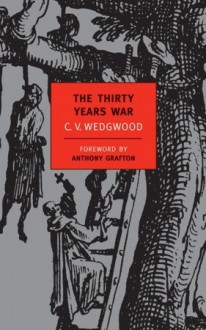



War is hell, just imagine it lasting for an entire generation with armies crisscrossing the same ground again and again producing famine, depopulation, and disease all in the name of religion, nationalism, and then finally simple greed. C.V. Wedgwood’s The Thirty Years War covers nearly a half century of history from the causes that led to the conflict through its deadly progression and finally it’s aftereffects.
From the outset Wedgwood sets the German domestic and the continental political situations in focus by stating that everyone was expecting war but between Spain and the Dutch while the German economy was on the decline due to the rise of new trading patterns over the course of the last century. It was only with the succession of the Bohemian throne and the ultra-Catholic policies of the Ferdinand II after his election that started the war everyone knew was coming, sooner and further east than expected. The war began as a purely religious conflict that saw the Catholic German princes led by Emperor Ferdinand crush the Protestant opposition because many of the Protestants decided not to help one another until it was too late due to political conservatism that Ferdinand used to his advantage. It wasn’t until Gustavus Adolphus and the Swedes entered the conflict a decade later that the conflict turn slowly from religious to international and an extension of the Bourbon-Habsburg in which the former used first allies then their own troops to prevent the encirclement of France by both branches of the Habsburgs. The negotiations for the end of the war took nearly five years and would change as events in the field would change strategies until finally allied members of the Bourbon and Habsburgs would cut deals with the other side to quickly break deadlocks and achieve peace but how it took almost six years to stand down the armies to prevent chaos.
Wedgwood’s narrative historical style keeps the book a very lively read and makes the war’s progress advancing even when she’s relating how the continuous fighting was affecting the German population. She is very upfront with the men, and a few women, who influenced the conflict throughout it’s course from the great kings of Ferdinand II, Christian IV of Denmark, and Gustavus to the great princes Maximillian I of Bavaria, John George of Saxony, and Frederick Henry of Orange to the mercenary generals that gained in importance as the conflict continued like Albrecht von Wallenstein to finally the political masterminds of Richelieu and Mazarin. With such a large historical cast, Wedgwood’s writing keeps things simple and straight for the read thus allowing the conflict’s long drawn out nature to fully impact the reader and how it affected those out of power. And in describing the aftereffects, Wedgwood disarms many myths about the effects of the war that over three hundred years became considered fact.
The Thirty Years War by C.V. Wedgwood is an excellent narrative history of a conflict that saw the end of one kind of conflict and the beginnings of another with interesting personalities that fought and conducted policy around it while also showing the effects on the whole population. If you’re interested in seventeenth-century history or military history, this book is for you.

Covering over 450 years of history in a little over 300 pages seems a daunting task, even more so when it begins in Europe and slowly spreads across the globe. Western Civilization since 1500 by Walther Kirchner is a survey of the rise of European global dominance from the beginnings of “modern times” to the generation after World War II when the periphery powers of the United States and Soviet Union rose to dominance.
Kirchner spends the first 20 pages doing a quick recap of Western Civilization from its Sumerian beginnings to 1500. Then over the course of the next 300 pages, Kirchner divides the approximately 450+ years of history into 20 chapters of specific “eras” whether political and/or cultural developments and happenings. Unlike Kirchner’s previous survey, there was no real “highlight” for the general reader though the significance of some cultural individuals—writers, painters, composers, etc.—that in my own Western Civ and World History classes in high school and college were never mentioned or those that were mentioned that Kirchner didn’t thus showing the difference 30-35 years makes in historical studies. Kirchner obvious adherence to the Marxist theory of history was on full display, but it did not necessarily mean a favorable view of Communist regimes or leaders. As study aid for college students in the mid-1960s there were some interesting miscues (the misdating of the Battle of Yorktown stands out), omissions (the genocidal famine caused by the First Five Year Plan), and downright lies (that the U.S. citizens were sympathetic to the British from the beginning of WWII). Given that this book is over 50 years old there is dated terminology that wouldn’t be used today, not all for politically correct reasons, that would make the reader do a double take if they didn’t know when this book was published.
Though this small volume is meant as a study aid to college students and a quick reference for general readers, to which is essentially succeeds, it is pretty old and should be used by astute history readers to learn how the study of history has changed over time.

Twice in the last two centuries Germany was directed by an elderly man who exercised disproportionate control over their nation's development at a critical time in their history. The first was Otto von Bismarck, who created the German empire in 1871 and presided over its development for nearly two decades. The second was Konrad Adenauer, who became the first chancellor of postwar West Germany in 1949, guiding its transition in the postwar era from a collection of occupied territories through its postwar rehabilitation and subsequent emergence as a cornerstone of a more unified Europe. Much like Bismarck, Adenauer rose to power through unlikely circumstances, but unlike Bismarck he left behind him a governing system that proved more capable of enduring without him.
In writing a biography of Adenauer for Longman's "Profiles in Power" series, Ronald Irving faces the task of providing both an account of Adenauer's life and an examination of how he exercised his authority. This he succeeds in doing, providing an account that is understandably weighted towards analysis of his time as chancellor but still sets it within the details of Adenauer's long life. This balance is important to Irving's interpretation of Adenauer, whom he sees as a product of his early life as a Catholic Rhinelander in Wilhelmine Germany. By the time the Second Reich collapsed in 1918 Adenauer was already mayor of Cologne, an office he would occupy for the span of the Weimar Republic. Forced out of office by the Nazis, Adenauer returned to politics after the war determined to prevent a recurrence of the Third Reich by establishing a true representative democracy in Germany, first by creating a national conservative political party across confessional lines, then by serving as chancellor of West Germany for fourteen years.
Nearly three-quarters of Irving's book is spent on Adenauer's postwar career, giving him the opportunity to detail the scope of the chancellor's achievement. He is particularly good at explaining Adenauer's foreign policy — both the reestablishment of a sovereign Germany and his efforts towards greater European integration — and his role in West German politics. While some background on the context of Adenauer's times helps to fully benefit from the nuance of Irving's analysis, even people seeking an English-language introduction to Adenauer will find much to value in this short, insightful study.